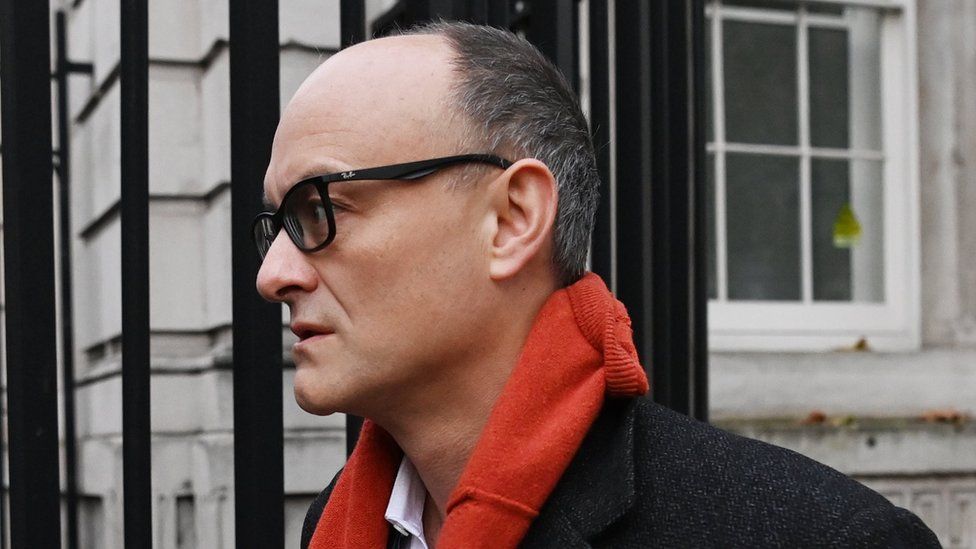Dominic Cummings to leave Downing Street by Christmas
- Published

Boris Johnson's senior adviser Dominic Cummings is expected to leave his position by the end of the year.
Mr Cummings told the BBC "rumours of me threatening to resign are invented", after speculation this week.
But he added that his "position hasn't changed since my January blog" when he said that he wanted to make himself "largely redundant" by the end of 2020.
And a senior Downing Street source said that Mr Cummings would be "out of government" by Christmas.
BBC political editor Laura Kuenssberg said there was no question the announcement of his departure was "accelerated by turmoil in No 10 in recent days".
It comes after Lee Cain - the director of communications and an ally of Mr Cummings - stood down amid reports of internal tensions at Downing Street.
The pair are long-time colleagues, having worked together on the Leave campaign during the EU referendum - and Mr Cain's departure prompted rumours that his ally would also step down.
Meanwhile, former Treasury adviser Sonia Khan, sacked after Mr Cummings accused her of leaking from inside Downing Street, has settled her unfair dismissal claim with the government.
Speaking to the BBC's political editor, Mr Cummings denied that he had threatened to resign after Mr Cain's departure - and instead pointed out that he had indicated his own plans nearly a year ago.
While it's tempting to see this is as a dramatic and sudden eruption, it has been a longer-term burn.
The prime minister's chief adviser stepped back somewhat from some of the brutal day-to-day politics he had helped create after the election.
He had been spending more time focusing on trying to rewire Whitehall - trying to increase the importance of science and data in government - hoping to be less involved in the moment-by-moment political rush.
But given his profile, and his nature, was that ever a realistic plan?
After Boris Johnson became prime minister in July 2019, he hired Mr Cummings to be his senior adviser, and six months later the pair's strategy of stressing "Get Brexit Done" as the main campaign message helped the party win a large majority in the general election.
Mr Cummings has become more of a public figure in the past year and was forced into holding his own news conference at Downing Street in the summer, following controversy over him making a trip to the north of England when non-essential travel was banned at the height of the coronavirus lockdown.
Who is Dominic Cummings?
- Dominic Cummings, 48, ran the pro-Brexit Vote Leave campaign in the EU referendum and was behind the group's "take back control" slogan
- Prior to the referendum he worked for Iain Duncan Smith when he was Conservative Party leader and Michael Gove at the Department for Education
- Born in Durham, Mr Cummings went to a state primary school before being privately educated at Durham School. He graduated from Oxford University with a first-class degree in modern history
- A longstanding Eurosceptic, he cut his campaigning teeth as a director of the anti-euro Business for Sterling group and once ran a successful campaign to oppose a regionally elected assembly in north-east England
- He was portrayed by actor Benedict Cumberbatch in the Channel 4 drama Brexit: The Uncivil War
Transport Secretary Grant Shapps told BBC Breakfast he was "not particularly surprised" by the announcement, adding that "advisers come and go over a period of time".
Asked if his departure of Mr Cummings and Mr Cain suggested the prime minister was intending to follow a very different path, Mr Shapps said Mr Johnson had "always taken advice from a very wide range of people and doesn't always side with the same people at the end of that decision-making process".
Tory MP Theresa Villiers - who was in cabinet until February - said the chief adviser's exit offered "an opportunity for a fresh start" and a "more collegiate" approach from No 10.
She told BBC News: "There is no doubt that both Dominic Cummings and Lee Cain were pretty dismissive of backbenchers, and on some occasion ministers and secretaries of states as well, and I don't think that was helpful.
"I do think it is important whoever takes over from these two has a different approach."
'Useful idiots'
Writing in his blog in January 2020 to encourage "weirdos" to work in No 10, Mr Cummings said he wanted to "improve performance" in government in order to "make me less important - and within a year largely redundant".
Since taking his job at Number 10, he has not been a popular figure with everyone within the governing party, and was known for making disparaging comments about some of Mr Johnson's own MPs, including labelling Brexiteer MPs "useful idiots".
How powerful is Dominic Cummings?
It was widely suggested that former Conservative leader Sir John Major was talking about Mr Cummings when he warned Mr Johnson in a speech in September 2019 not to rely on "overmighty advisers".
Sir John, who led the country from 1990 to 1997, added: "I offer the prime minister some friendly advice: get rid of these advisers before they poison the political atmosphere beyond repair. And do it quickly."
In Taking Control: The Dominic Cummings Story, the BBC's Emily Maitlis examines his place in our changing political landscape, stretching back over two decades. Watch the documentary here (UK only).
- Published13 November 2020
- Published20 July 2021
- Published12 November 2020
- Published28 May 2020